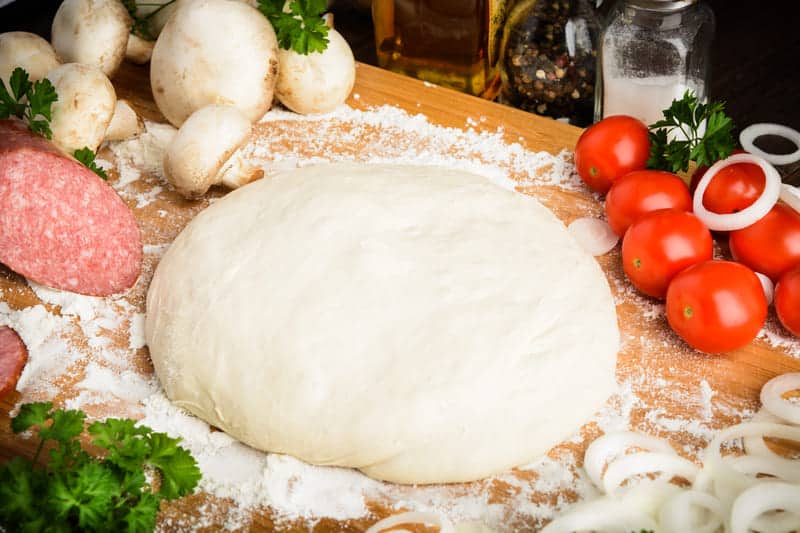Everyone loves a delicious and cheesy pizza topped with all sorts of things such as vegetables, herbs, chicken, pepperoni, pineapples, you name it. But if you love baking, you must know that the most important part of a delicious pizza is a well-made dough.
Ideally, you should let the pizza dough rise until it has doubled its original size. This takes about 1-1.5 hours. Some people even prefer letting the dough rest and rise for 1-2 days.
However, it can get tricky to figure out the perfect rising time for pizza dough. What should the ideal temperate for rising pizza dough be? Can you refrigerate pizza dough? What do you do if your pizza dough rises too much or too little?
Well, there is absolutely no need for you to worry. I have got you covered with answers for every question that you might have, and more. Keep on reading!
Can You Let Pizza Dough Rise For Too Long?
You probably won’t be surprised to hear that you can’t let pizza dough rise for too long. Leaving the dough to rise for too long can cause the gluten inside to be excessively relaxed. In that case, your dough will collapse and become gummy and rough.
Now, let’s learn what exactly happens when pizza dough rises. When you leave your dough to rise, the yeast turns sugar into carbon dioxide and alcohol. This makes the dough soft and flavorful after you bake it.
Additionally, letting the sugar inside the pizza dough ferment for too long will make more alcohol than necessary in it. Therefore, keeping your dough out to rise longer than normal can add some extra flavor, but you need to be careful to not overdo it.
If you let your dough rise for too long, not only will it be likely to collapse, but it will also have a sour taste because of too much alcohol and over-fermentation. So, you might have realized how important the rising time is in order to make good pizza dough.
How Long Can You Let Pizza Dough Rise At Room Temperature?
You can let your pizza dough rise at room temperature from a few hours to a few days. It depends on the temperature, ingredients, and preparation method. For room temperature pizza dough, I suggest 2-4 hours of rising time.
A rule of thumb is that the warmer it is in your house, the faster your dough will rise. You can let your dough rise for a little longer than usual if you want a richer flavor. However, make sure that you do not overdo it. Otherwise, your dough will collapse.
If you are dealing with store-bought pizza, it won’t take long for the dough to rise. This is because they have more sugar and yeast than homemade dough. As sugar and yeast play a key part in the fermentation process, the more you use, the faster the dough rises.
However, this is not always the case. Some people intentionally leave their pizza out for as long as a few days to make a sourdough pizza crust. If that is the direction you choose, you need to ensure that your pizza dough turns out to have a solid texture.
What Happens If You Don’t Let Pizza Dough Rise?
You cannot skip on letting your pizza dough rise. Otherwise, you’re in for a gummy and flavorless crust for your pizza.
Not letting pizza dough rise for an adequate amount of time will not allow any fermentation of yeast and sugars, which means there will be no release of gas, carbon dioxide, and alcohol.
Without this release of gasses, your pizza dough will not have the airy texture and the flavor that it should. Instead, the dough will taste sticky and ruin your entire pizza.
Not only is letting pizza dough not rise bad, but you should also let your pizza dough rise two times. When you notice that your pizza dough has risen to a normal height, knead the dough again lightly.
Kneading an already risen pizza dough allows some of the gas to escape and makes the texture more firm. Letting your dough rise for the second time will cause it to have a softer end product and release any pressure that the dough was holding.
Moreover, allowing this second round of rising will boost the flavor of your pizza dough. As you might have guessed by now, a pizza with a crust that has a unique flavor will taste much better than a pizza with a dense and tasteless crust.
How Long Can You Let Pizza Dough Rise In The Fridge?
The answer is at least 24 hours. Letting your dough rise in the fridge is a great way to make an airy, flavorful, and soft base. In fact, not many people know that refrigeration will give you much better results than letting the dough rise at room temperature.
Putting your dough in the fridge makes it more elastic and lets air pass through easily. You can also store your pizza dough for a few days without the chances of it getting spoiled.
So, if you’re ever low on time, just prepare some pizza dough and leave it in the fridge until you are ready to cook it.
Fermenting pizza dough in the fridge (or even in the freezer) allows the gluten to settle in more easily, resulting in an airy, soft pizza that is easier for you to digest.
Moreover, cold fermentation makes your pizza more flavorful than at room temperature.
What To Do if Pizza Dough Rises Too Much?
If you are reading this article in the hope that there is something that can salvage a pizza dough that has risen too much, I have got you covered. As mentioned before, letting a pizza dough rise for too long will make it sour and likely collapse.
If you notice that your pizza dough has risen too high, you can fix it by kneading it again. Ignoring this easy step will leave you with a crust that is hard to chew. Kneading will cause deflation in the dough and prevent carbon dioxide from escaping.
While you know all the tips for making a perfectly risen pizza dough, you now also know what to do if you leave it to rise for too long.
Let’s Bake A Pizza!
It might seem insignificant, but the rising time can make or break your pizza dough. Too much, and you’ll end up with a sour-tasting dough, too little and your pizza crust becomes difficult to chew.
I hope that after reading this article, you won’t have any of these problems. Now that you know what exactly to do, I am sure that you’ll be taking your pizza to the next level.


